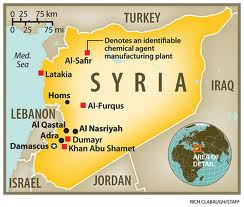 Secretary of State Hillary Rodham Clinton indicated Wednesday that Washington is as concerned about Syria’s chemical weapons falling into the hands of Syrian rebels as it is about the possibility that Syrian President Bashar Assad may decide to deploy them.
Secretary of State Hillary Rodham Clinton indicated Wednesday that Washington is as concerned about Syria’s chemical weapons falling into the hands of Syrian rebels as it is about the possibility that Syrian President Bashar Assad may decide to deploy them.
“Our concerns are that an increasingly desperate Assad regime might turn to chemical weapons, or might lose control of them to one of the many groups that are now operating within Syria,” Clinton told reporters at the end of two days of NATO ministerial meetings in Brussels. “We have sent an unmistakable message that this would cross a red line and those responsible would be held to account.”
Rebels have been making substantial territorial gains in Syria and have overrun a number of Syrian military bases, capturing supplies of conventional weapons. U.S. officials have indicated that Syria’s chemical weapons stocks remain secure, but officials and experts have voiced concern that insurgents could seize facilities where chemical agents are stored.
Western and Israeli officials are believed to be closely monitoring known Syrian chemical weapons depots. An unanswered question is whether signs of a rebel approach on a chemical facility would trigger an international response to prevent toxic weaponry from falling into the hands of insurgent militias.
The fragmented Syrian rebel force includes many Islamist units and several brigades said to be linked to Al Qaeda. The presence of such militants is one reason why the Obama administration has thus far declined to provide weapons to the rebels fighting to oust Assad, whom Obama has called on to step down.
Assad took steps to keep chemical weapons out of the hands of militants, the news agency Reuters reported Wednesday, citing an interview with Israel’s vice prime minister, Moshe Yaalon.
“Clear messages were relayed to Assad on a number of opportunities, and in response Assad in fact gathered up the weaponry and separated the material,” Reuters quoted Yaalon as telling the Israeli news website Walla.
The disposition of Syria’s chemical stockpiles is an especially sensitive issue in Israel, with its close proximity to Syria, leaving it potentially vulnerable to Syrian ballistic missiles and warplanes. “There is speculation that the chemical arsenal will fall into the hostile and irresponsible hands of the likes of Al Qaeda or other terrorist groups,” Yaalon said.
In the interview, Yaalon confirmed that Washington had spotted “suspicious activity” at Syria’s chemical stockpiles, prompting President Obama to issue a stern warning to Assad this week that use of chemical weapons would not be tolerated.
The prospect of a chemical attack via ballistic missiles is one reason NATO this week agreed to Turkey’s request that Patriot anti-missile batteries be deployed at points along Turkey’s more than 500-mile border with Syria. Turkish news reports Wednesday quoted Foreign Minister Ahmet Davutoglu as saying that Syria possesses about 700 missiles and that the government in Ankara knows exactly where they are.
LA Times

Leave a Reply
You must be logged in to post a comment.